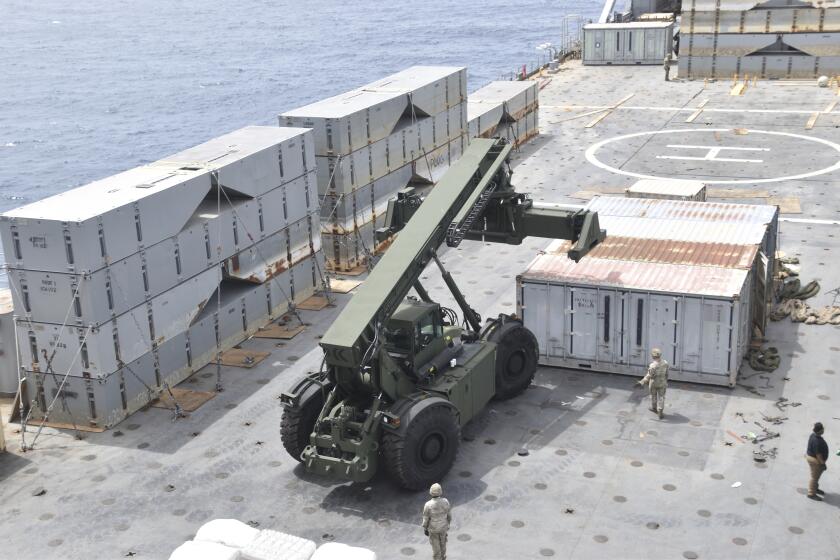Accused Hijacker May Be Tried in U.S.
U.S. officials are debating whether to try accused terrorist leader Abul Abbas in America or send him to Italy for punishment, and they rejected the claim of the Palestine Liberation Organization that he should be set free under an 8-year-old international agreement.
Abbas, who allegedly masterminded the deadly 1985 hijacking of the Italian cruise ship Achille Lauro, was captured by U.S. forces late Monday in Baghdad, where he had been given sanctuary by the regime of Saddam Hussein.
Abbas was given a life prison term by the Italians for the hijacking that led to the death of cruise ship passenger Leon Klinghoffer, a 69-year-old Jewish American. He has also been sought by U.S. authorities, who have been eager to send a strong message to terrorists that they will be punished for killing Americans.
U.S. officials said Wednesday that their first priority is to determine whether Abbas, 54, can provide them with information on Iraqi leaders or the presence of other terrorist groups in Iraq. Establishing Hussein’s support for terrorism, which was part of the justification for invading Iraq, is a key goal of the Bush administration.
At the same time, officials of the Pentagon, the State Department and the Justice Department are weighing the requirements of U.S. statutes and international law.
State Department spokesman Philip T. Reeker said the government is “already looking at a variety of opinions to make sure he is brought to justice” and has been talking to the government of Italy.
But U.S. officials discounted the PLO’s assertion that Abbas should be freed under a 1995 interim agreement between Israel and the PLO that was also signed by President Clinton. The agreement provides that no PLO leader should be tried for alleged crimes that occurred before 1993, the year of the Oslo peace accords between Israel and the Palestinians.
Reeker said that “the United States is not a party to that, or any amnesty arrangements regarding Abul Abbas.”
Saeb Erekat, a Cabinet member of Yasser Arafat’s Palestinian Authority, demanded Wednesday that Abbas be released under the terms of the 1995 agreement. Israeli officials, on the other hand, welcomed the news of Abbas’ capture, saying that justice had been served at an apt time, as Jews prepared to celebrate the start of Passover on Wednesday night.
The praise by Israel seemed to contradict the country’s stance of just a few years ago. Then, the Israeli Supreme Court declared that Abbas could not be tried for the Achille Lauro incident.
Additionally, Israeli officials concluded that Abbas had renounced violence and allowed him to return to Gaza City, which he visited periodically.
In Beirut, Abbas’ wife, Reem Nimr, told Al Jazeera television that she was shocked by his arrest, Reuters reported. “I hope the American authorities free him. Abul Abbas is not a member of [Hussein’s] Baath Party or Iraqi leadership and is not party to this war at all,” she said.
Abbas’ Palestine Liberation Front, or PLF, has its headquarters in Damascus, the Syrian capital. But it is now one of the smaller groups within the PLO, overshadowed by better-known factions such as the Popular Front for the Liberation of Palestine and the Democratic Front for the Liberation of Palestine.
The PLF, though active in some Palestinian circles, ranks low when compared with such high-visibility organizations as the Islamic militant group Hamas or the Al Aqsa Martyrs Brigade, linked to Arafat’s Fatah faction, which have been responsible for many of the suicide attacks of the current intifada, or Palestinian uprising.
In fact, knowledgeable Palestinians were hard pressed Wednesday to identify any acts of violence in recent years that have been connected to Abbas’ group. Founded in 1977 as a splinter group from the Popular Front for the Liberation of Palestine, the PLF itself was made up of different wings. As a whole, the PLF is part of the camp that shunned the 1993 Oslo accords. It openly disagrees with Arafat and his policies.
In the 1980s, one wing allied itself with Syria, while Abbas and his cohorts were a part of the pro-Iraqi faction.
Richter reported from Washington and Chu from Jerusalem.
More to Read
Start your day right
Sign up for Essential California for news, features and recommendations from the L.A. Times and beyond in your inbox six days a week.
You may occasionally receive promotional content from the Los Angeles Times.








